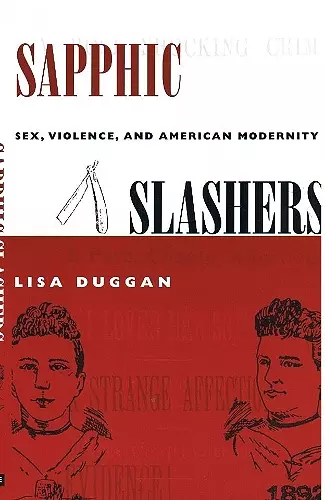Sapphic Slashers
Sex, Violence, and American Modernity
Format:Hardback
Publisher:Duke University Press
Published:10th Jan '01
Currently unavailable, and unfortunately no date known when it will be back

Retells and analyses lesbian love murder stories from the 1890s to the 1930s to show how narratives of sex and violence were used to privatize populations and cultures, substituting a rhetoric of moral pedagogy for democratic debate.
In 1892, in the broad daylight of downtown Memphis, Tennessee, a middle class woman named Alice Mitchell slashed the throat of her lover, Freda Ward, killing her instantly. Local, national, and international newspapers, medical and scientific publications, and popular fiction writers all clamoured to cover the ensuing "girl lovers" murder trial.On a winter day in 1892, in the broad daylight of downtown Memphis, Tennessee, a middle class woman named Alice Mitchell slashed the throat of her lover, Freda Ward, killing her instantly. Local, national, and international newspapers, medical and scientific publications, and popular fiction writers all clamored to cover the ensuing “girl lovers” murder trial. Lisa Duggan locates in this sensationalized event the emergence of the lesbian in U.S. mass culture and shows how newly “modern” notions of normality and morality that arose from such cases still haunt and distort lesbian and gay politics to the present day.
Situating this story alongside simultaneously circulating lynching narratives (and its resistant versions, such as those of Memphis antilynching activist Ida B. Wells) Duggan reveals how stories of sex and violence were crucial to the development of American modernity. While careful to point out the differences between the public reigns of terror that led to many lynchings and the rarer instances of the murder of one woman by another privately motivated woman, Duggan asserts that dominant versions of both sets of stories contributed to the marginalization of African Americans and women while solidifying a distinctly white, male, heterosexual form of American citizenship. Having explored the role of turn-of-the-century print media—and in particular their tendency toward sensationalism—Duggan moves next to a review of sexology literature and to novels, most notably Radclyffe Hall’s The Well of Loneliness. Sapphic Slashers concludes with two appendices, one of which presents a detailed summary of Ward’s murder, the trial, and Mitchell’s eventual institutionalization. The other presents transcriptions of letters exchanged between the two women prior to the crime.
Combining cultural history, feminist and queer theory, narrative analysis, and compelling storytelling, Sapphic Slashers provides the first history of the emergence of the lesbian in twentieth-century mass culture.
“A book to die for! Theoretically sophisticated, yet written with clarity and elegance, Sapphic Slashers opens whole new worlds of understanding about sexuality, gender norms, racial injustice, violence, and the complex ways they are connected. Full of passion and intelligence, it made me think in fresh new ways about issues of great importance. Duggan’s is an amazing intellect.”—John D’Emilio, coauthor of Intimate Matters: A History of Sexuality in America
“Duggan seamlessly combines cultural theory with analyses of material conditions and demonstrates a breathtaking command of American cultural institutions—the mass press, the judicial systems, the medical literature. The book is not only smart about the interconnections between gender, sex, race, class, and nation, but is also lucid, making a good read.”—Elizabeth Lapovsky Kennedy, author of Boots of Leather, Slippers of Gold: The History of a Lesbian Community
“In this stunningly coherent and compelling account of the development of ‘American modernity,’ Duggan captures our interest with the sensational tale of lesbian love murder but then insists that we read this tale through turn-of-the-century debates over racial violence and against the backdrop of the medicalization of homosexuality. Sapphic Slashers has ‘classic’ written all over it.”—Judith Halberstam, author of Female Masculinity
“What Duggan does in this original and moving book is take a murder case from 1890’s Memphis and make of it a prism through which to illuminate American modernity. Her method depends less on an account of the murder or of the judicial procedure that followed it than on an analysis of the many narratives—of lesbian love and sex and madness—that the case occasioned. Juxtaposing these narratives to narratives of lynching, Duggan produces a tour-de-force of historical understanding.”—Henry Abelove, Wesleyan University
ISBN: 9780822326090
Dimensions: unknown
Weight: 998g
328 pages